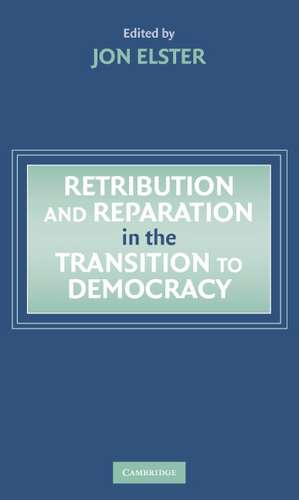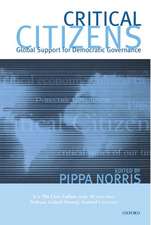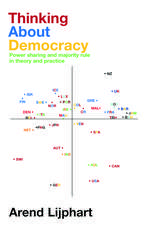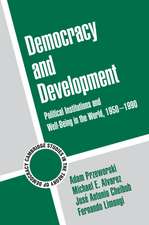Retribution and Reparation in the Transition to Democracy
Editat de Jon Elsteren Limba Engleză Hardback – 7 mai 2006
Preț: 796.93 lei
Preț vechi: 926.67 lei
-14% Nou
Puncte Express: 1195
Preț estimativ în valută:
152.54€ • 165.75$ • 128.22£
152.54€ • 165.75$ • 128.22£
Carte tipărită la comandă
Livrare economică 21 aprilie-05 mai
Preluare comenzi: 021 569.72.76
Specificații
ISBN-13: 9780521829731
ISBN-10: 0521829739
Pagini: 352
Dimensiuni: 156 x 234 x 24 mm
Greutate: 0.73 kg
Editura: Cambridge University Press
Colecția Cambridge University Press
Locul publicării:New York, United States
ISBN-10: 0521829739
Pagini: 352
Dimensiuni: 156 x 234 x 24 mm
Greutate: 0.73 kg
Editura: Cambridge University Press
Colecția Cambridge University Press
Locul publicării:New York, United States
Cuprins
1. Introduction Jon Elster; Part I. General Issues: 2. Restitution: how far back should we go? Tyler Cowen; 3. Retribution Jon Elster; Part II. Germany and German-Occupied Countries after 1945: 4. Transitional justice in divided Germany after 1945 David Cohen; 5. Purges in France after the Liberation Henry Rousso; 6. Political justice in Austria and Hungary after World War II Istvan Deák; 7. Dealing with the past in Scandinavia Hans Fredrik Dahl; 8. Belgian and Dutch purges after World War II compared Luc Huyse; Part III. Latin America, Post-Communism, and South Africa: 9. Paranoids may be persecuted: post-totalitarian retroactive justice Aviezer Tucker; 10. Transitional justice in Argentina and Chile: a never ending story? Carlos H. Acuña; 11. Transitional justice in the German Democratic Republic and in Unified Germany Claus Offe and Ulrike Poppe; 12. Rough justice: rectification in post-authoritarian and post-totalitarian regimes Aviezer Tucker; 13. Accountability and the South African experience Alex Boraine; 14. Conclusion.
Recenzii
"How did, and how should, emerging democracies deal with members and supporters of fallen autocratic or occupation regimes? By fusing analytical approaches with historical perspectives, this fascinating and eminently readable volume addresses an enduring political question in a refreshing way, at once normative, theoretical, and empirical. A must-read."
-Stathis N. Kalyvas, Yale University
"This is a timely and important collection of rigorously argued essays that bring a welcome historical and comparative frame to the study of transitional justice in new democracies. Their nuanced considerations of the moral complexities in intergenerational claims for restitution and rich analyses of how emotions, intentions and beliefs shape trials and sanctions push our understanding of transnational justice to new levels."
-Mark Philip Bradley, Northwestern University
"The most searching and illuminating book available on the promises and disappointments of transitional justice. Elster's introduction and concluding chapters are analytical masterpieces and almost every chapter is a treasure house of information and insight."
-Stephen Holmes, NYU School of Law
"This is a highly enjoyable, analytically rigorous and historically rich collection of essays on a fascinating, timely, and consequential topic. It is an important contribution to the already substantial and growing literature on transitional justice...The chapters in this volume engage the reader in a continuous dialogue between theory and concrete examples, back and forth."
-Julio Rios-Figueroa, NYU School of Law, The Law and Politics Book Review
-Stathis N. Kalyvas, Yale University
"This is a timely and important collection of rigorously argued essays that bring a welcome historical and comparative frame to the study of transitional justice in new democracies. Their nuanced considerations of the moral complexities in intergenerational claims for restitution and rich analyses of how emotions, intentions and beliefs shape trials and sanctions push our understanding of transnational justice to new levels."
-Mark Philip Bradley, Northwestern University
"The most searching and illuminating book available on the promises and disappointments of transitional justice. Elster's introduction and concluding chapters are analytical masterpieces and almost every chapter is a treasure house of information and insight."
-Stephen Holmes, NYU School of Law
"This is a highly enjoyable, analytically rigorous and historically rich collection of essays on a fascinating, timely, and consequential topic. It is an important contribution to the already substantial and growing literature on transitional justice...The chapters in this volume engage the reader in a continuous dialogue between theory and concrete examples, back and forth."
-Julio Rios-Figueroa, NYU School of Law, The Law and Politics Book Review
Descriere
The contributions in this volume offer a comprehensive analysis of transitional justice from 1945 to the present.

















